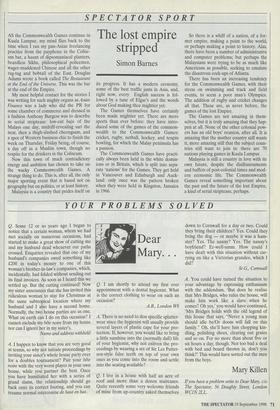SPECTATOR SPORT
The lost empire stripped
Simon Barnes
AS the Commonwealth Games continue in Kuala Lumpur, my mind flies back to the time when I ran my pan-Asian freelancing practice from the payphone in the Colise- um bar, a haunt of dipsomaniacal planters, beardless Sikhs, philosophical policemen, wager-maddened Chinese and all the other rag-tag and bobtail of the East. Douglas Adams wrote a book called The Restaurant at the End of the Universe. This was the bar at the end of the Empire.
My most helpful contact for the stories I was writing for such mighty organs as Asian Finance was a lady who did the PR for some chamber of commerce and dressed in a fashion Anthony Burgess was to describe as serial striptease: low-cut baju of the Malays one day, midriff-revealing sari the next, then a thigh-slashed cheongsam, and a spot of Western business chic to finish the week on Thursday, Friday being, of course, a day off in a Muslim town, though no respite for the drinkers in the Coliseum.
Now this town of much contradictory energy and ambition has chosen to take on the wacky Commonwealth Games. A strange thing to do. This is, after all, the only major sporting event that is based not on geography but on politics, or at least history. Malaysia is a country that prides itself on its progress. It has a modern economy, some of the best traffic jams in Asia, and, right now, every English success is fol- lowed by a tune of Elgar's and the words about God making thee mightier yet.
The Games themselves have certainly been made mightier yet. There are more sports than ever before: they have intro- duced some of the games of the common- wealth to the Commonwealth Games: cricket, rugby, netball, hockey, and tenpin bowling, for which the Malay peninsula has a passion.
The Commonwealth Games have practi- cally always been held in the white domin- ions or in Britain, which is split into sepa- rate 'nations' for the Games. They get held in Vancouver and Edinburgh and Auck- land: only once was the pattern broken when they were held in Kingston, Jamaica in 1966. So there is a whiff of a nation, of a for- mer empire, making a point to the world, or perhaps making a point to history. Alas, there have been a number of administrative and computer problems; but perhaps the Malaysians were trying to be as much like Americans as possible, seeking to emulate the disastrous cock-ups of Atlanta.
There has been an increasing tendency for the Commonwealth Games, with their stress on swimming and track and field events, to seem a poor man's Olympics. The addition of rugby and cricket changes all that. These are, as never before, the games of the lost Empire.
The Games are not amazing in them- selves, but it is truly amazing that they hap- pen at all. None of the other colonial pow- ers has an old boys' reunion, after all. It is amazing that the mother country still wants it, more amazing still that the subject coun- tries still want to join in: there are 70 nations playing games in Kuala Lumpur.
Malaysia is still a country in love with its own future, despite the disillusionments and buffets of post-colonial times and mod- ern economic life. The Commonwealth Games reveal something important about the past and the future of the lost Empire, a kind of serial striptease, perhaps.










































































 Previous page
Previous page